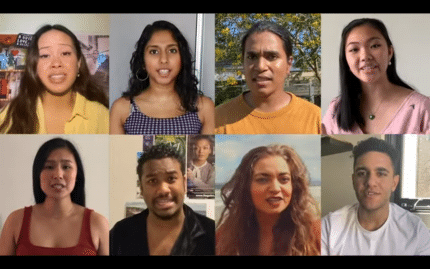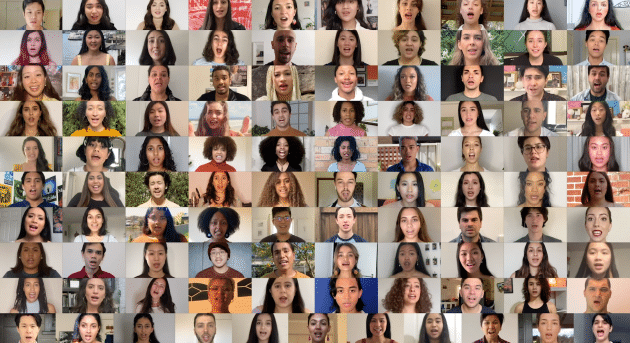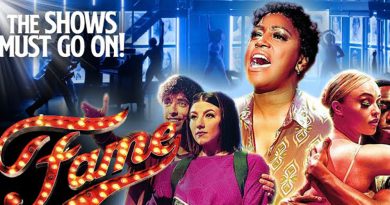Vidya Makan on making music for social change
The events of 2020 so far have been a catalyst for change, particularly regarding the treatment of Bla(c)k, Indigenous, and People of Colour (BIPOC) in the global community. The rise of the BLM movement has reignited discussions of racial discrimination both in Australia and worldwide — an effect most recently seen in the outpouring of frustration within our own theatre community in response to the Rob Guest Endowment situation.
Enter: Vidya Makan.

A change-maker through and through, Vidya has done it all. A critically acclaimed singer, actor, composer, and lyricist, she was most recently seen as Catherine Parr in the Australian tour of Six: The Musical. Her other appearances include shows such as Sunday in the Park With George as Dot/Marie (Watch This), a role which earned her a Green Room Award nomination, Romeo and Juliet as Lady Capulet (Australian Shakespeare Company), American Idiot (Shake & Stir), and Air Race (Arena Theatre). She’s had composition commissions from organisations such as the National Gallery of Victoria and Chips & Gravy Films, sits on the panel for the Artists of Colour Initiative (AOC), and is even collaborating with Hayes Theatre Co. on a song cycle — Straya: The Lucky Country. A fervent advocate for racial justice, she’s created many original works which give space to BIPOC voices and their experiences — the next of which is her new song, ‘I Need You To See Me.’
‘I Need You To See Me’ is an open letter from artists of colour to the industry. It showcases the voices that, for far too long, have been misrepresented, forgotten, and overlooked in the arts landscape. Featuring 101 BIPOC and CALD (Culturally and Linguistically Diverse) performers aged 18 to 25, the song is an anthem of change, a hopeful cry for a better world, one where BIPOC and CALD performers can feel safe, respected, and admired.
Was there a particular moment or event that inspired this project?
Diverse representation on Australian stages is something that I have always been passionate about; championing under represented voices and stories sit at the heart of all of my work. The events of this year have seen the movement for inclusivity become stronger and stronger by the minute, and given the significant media attention around the subject, I felt I wanted to write a piece that practiced what so many amazing activism pieces were preaching. I wanted to prove to the wider public something that that BIPoC and CALD community have always known to be true; that a huge range of incredible, hard working, talented and diverse artists exist here in Australia. And when these artists are presented with an opportunity that they feel confident will nurture and champion their humanity and craft, they will show up. I also find it completely bizarre that musicals are inherently about the underdog story, hope and “a better day” and yet our commercial shows far from reflect that when it comes to casting and representation! It is time, as an industry, to start practicing what we preach. If we are constantly singing about a better future, we need to actually start creating one.
What does your songwriting process usually look like?
For me, as a musical theatre writer, story and character always come first. So my process always starts with research and/or chats with my creative team to fully understand what the song is trying to say. This stage is about 70% of the work I think! Once the idea is really clear and well researched, I work on the lyrics which always come with a melody in my mind, and then the music comes after that to enhance and embellish the lyric. But I am definitely still in the early stages of my writing career, and certainly learning and changing as I go!
Which is trickier, music or lyrics?
Goodness… both I think! I don’t necessarily find one trickier than the other. I think I really struggle when I don’t have a fully fledged idea of what the concept is going to be. But when I know the character or story well, I find the joy of the process to be translating that into the character of the music and lyrics.

What inspired you to make I Need You To See Me into a collaboration?
Great Musical Theatre is always the result of collaboration. Even when it seems like a solo job, there is always a team in the background working to make something excellent. In deciding I wanted to make a statement on diverse representation, it was an absolute no brainer to me that the process behind the piece also needed to reflect the art that I was making. I am so lucky to have had an incredible team of creatives working with me to make something that I feel is really, really special. And don’t get me started on the talent of the 101 voices in the piece!!! I’m obsessed with each and every one of them. Reaching out to people and spaces and finding new collaborators with different thoughts to your own will only ever expand a piece of art to something beyond what you ever thought it could be. That is what has happened with this project, and I am so so so proud of what we have created as a team.
And what was that collaborative process like?
Well, I started the project by making a call out on my Instagram for BIPoC artists aged 18-25 who wanted to be “part of the revolution”. Very soon, I had masses of messages flooding in from incredible artists who all fit the bill, excited to be part of something that would champion their humanity. I also had many allies who reached out to me who wanted to help in any way they could. I immediately took the opportunity to say “yes”, and the wonderfull Kathleen Higgs came on board to help me organise these 101 incredible artists. I then started writing the song. After 48 hours of writing — and no sleeping — I finally came up with a draft and presented it to dramaturg and long time friend Sonya Suares. Sonya was really honest with me, and said that the heart of the song laid slightly to the side of what I’d written. This really sucked to hear, but I’m glad she said it! I went back to the drawing board, and the next day, ‘I Need You To See Me’ was written. Sonya helped tidy up the little details of it, and after that, I arranged the piece into 101 parts, recording demos for each and every cast member. The cast then sent through their vocal parts and Anusha ‘Switch’ Matthews came on board as our sound engineer, working tirelessly to sort through over 280 vocal files. Ned Wright-Smith came on board to create an orchestral arrangement, and the three of us worked really hard together to create what is now this incredibly produced track. Ash Mckenzie from ‘Workshop Creative’ then reached out to me to get involved in creating the video, and once the track was completed, the cast sent through their videos! I truly believe that our process behind the scenes has been a true example of what we want to see happen in the industry. Individuals who are different from each other, conversing honestly, challenging each other, listening to each other and respecting one another with the intent on one common goal: to create a meaningful, outstanding and world class product.
Why does music have such power to bring about social change?
Music does this really cool thing where it has the power to go past our “conscious” or “rational” way of thinking about things, and move directly through our limbic system (the set of structures in the brain that deal with emotion and memory). This is why, as humans, we often have such a primal response to music. Having the ability to access someone’s emotions — and, essentially, their humanity — is a powerful tool.. When it is done well, I believe music can not only provide comfort and guidance for people, but actually has the ability to change the way someone may think or feel and unite us, because it speaks through a universal language.
Check out Vidya’s website to stay up-to-date with her future performances and projects.




